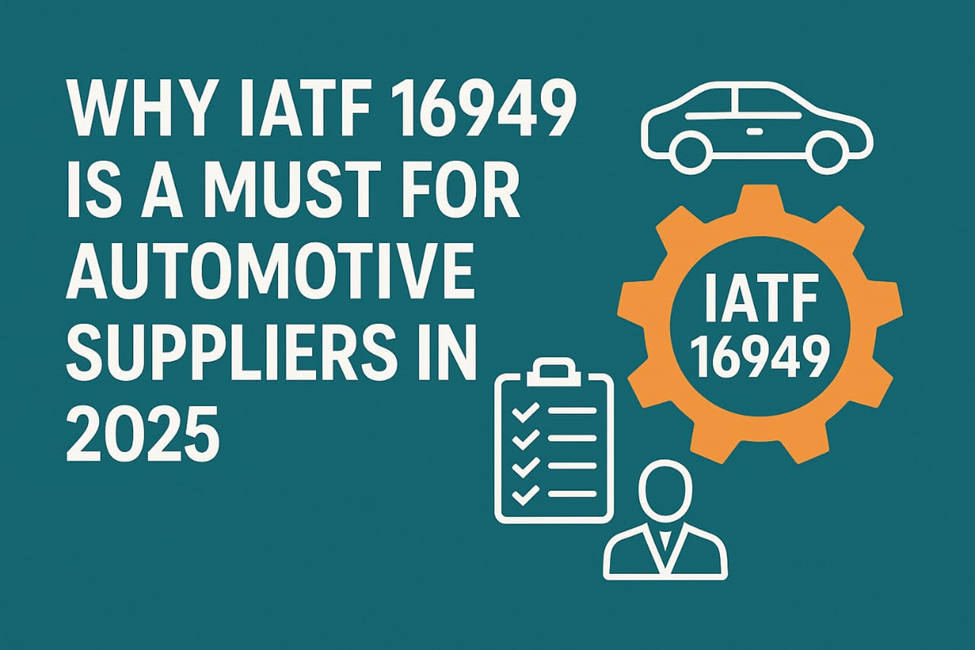Why IATF 16949 Is a Must for Automotive Suppliers in 2025
In today’s fast-evolving automotive
landscape, maintaining consistent product quality, safety, and reliability is
no longer optional—it’s essential. As we move into 2025, global automotive
suppliers are under growing pressure to align with stringent quality standards.
Among these, IATF 16949 stands out as the gold standard for quality
management in the automotive sector. If you’re an automotive supplier aiming
for long-term success, IATF
16949 certification is not just a smart move—it’s a necessity.
What Is IATF 16949?
IATF 16949 is a globally recognized standard developed by the International
Automotive Task Force (IATF) in conjunction with ISO. It harmonizes the
various quality system requirements within the global automotive industry and
is based on ISO
9001, with additional requirements tailored specifically for automotive
production and relevant service parts organizations.
The standard focuses on defect
prevention, continuous improvement, and reducing variation and waste in the
automotive supply chain.
Why IATF 16949 Matters More Than Ever in 2025
1.
OEM Expectations Are Rising
Leading Original Equipment
Manufacturers (OEMs) are increasingly requiring IATF 16949 certification from
their suppliers. In 2025, this trend is set to intensify as companies seek to
minimize risk and ensure uniform quality across their global supply chains.
Suppliers without IATF 16949 certification may find themselves locked out of
lucrative contracts.
2.
Complexity in Supply Chains
The modern automotive supply chain
is vast and complex, involving numerous vendors, locations, and technologies. IATF
16949 brings standardization, enabling smoother collaboration and
integration between suppliers and OEMs across the globe.
3.
Electric Vehicles & Technological Disruption
The shift to electric vehicles
(EVs) and autonomous driving systems demands higher precision, safety, and
performance. These cutting-edge components leave no room for defects or
inconsistencies. IATF 16949 provides a structured approach to ensure
flawless quality even in the most advanced manufacturing environments.
4.
Regulatory Pressure
Environmental and safety regulations
are tightening globally. With stricter laws on vehicle emissions, safety
features, and traceability, IATF 16949 helps suppliers stay compliant
through its systematic approach to quality and risk management.
Key Requirements of IATF 16949 Standard
- Customer-specific requirements
- Risk-based thinking
- Product safety protocols
- Contingency planning
- Supplier management and development
- Embedded software quality assurance
- Change and configuration management
- Warranty and field failure analysis
These requirements ensure that
suppliers not only meet but exceed industry expectations.
Benefits of IATF 16949 Certification
✅
1. Improved Product Quality
The core objective of IATF 16949 is
to enhance product and process quality. This leads to fewer defects, reduced
rework, and greater customer satisfaction.
✅
2. Global Market Access
Certification opens the door to
international markets, allowing suppliers to partner with major global
automotive brands who mandate IATF 16949 as a requirement.
✅
3. Risk Mitigation
By identifying and addressing risks
early, the standard helps avoid recalls, penalties, and brand damage.
✅
4. Operational Efficiency
Standardized processes, leaner
operations, and improved supply chain collaboration lead to cost savings and
increased productivity.
✅
5. Competitive Advantage
In a crowded market, being IATF
16949 certified sets your company apart, enhancing your reputation and making you
a preferred supplier.
IATF
16949 Implementation Process
Implementing IATF 16949 involves
several key steps:
1.
Gap Analysis
Evaluate existing systems and
processes against the IATF 16949 requirements.
2.
Planning & Resource Allocation
Form a cross-functional team, define
roles, and allocate resources for implementation.
3.
Documentation Development
Prepare the IATF 16949 manual,
quality policy, objectives, procedures, and records as required.
4.
Employee Training
Conduct IATF 16949 training
for staff to understand the standard, their responsibilities, and how to
contribute to compliance.
5.
Internal Audits
Perform audits to identify gaps and
ensure readiness for the final certification audit.
6.
Management Review
Top management evaluates audit
results, customer feedback, and overall system performance.
7.
Certification Audit
A third-party body conducts the
official IATF 16949 audit and, upon successful completion, issues the
certification.
How 4C Consulting Can Help
With extensive experience across 2500+
successful ISO implementations and 15,000+ hours of training delivered,
4C Consulting is a trusted partner in the journey to IATF 16949 certification.
Our
IATF 16949 Services Include:
- Gap analysis and implementation roadmap
- IATF 16949 documentation (manual, procedures, forms)
- Customized in-house IATF 16949 training
- Internal auditor training and support
- Pre-certification audit readiness
- Post-certification continual improvement support
Whether you're a Tier 1, Tier 2, or emerging automotive supplier, our IATF 16949 consultants offer end-to-end support tailored to your needs.
Final Thoughts
In 2025, the automotive industry
will continue to evolve at a rapid pace. Suppliers that prioritize quality,
consistency, and compliance will not only survive but thrive. IATF 16949
is more than a certification—it’s a strategic enabler of growth,
reputation, and long-term partnerships with global OEMs.
If you're ready to align your
operations with world-class quality standards, it’s time to embrace IATF 16949.




Comments
Post a Comment